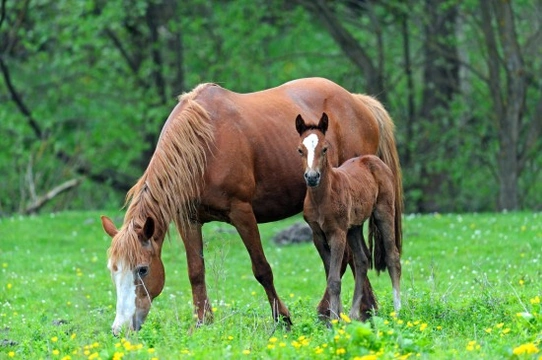
Do Horses Inherit Character Traits?
Over the years many studies and research have been carried out on whether horses inherit their temperaments from their parents in an attempt to breed horses that boast nice temperaments. However, when it comes to deciding which parent is the most important whether it is the "sire" or the "dam" that will pass on the all-important nice "character traits", the jury is still very much out.
With this said, research has shown that both dam and sire do contribute to the genetic make up of a foal and that they inherit an equal 50% share of each of their parents chromosomes. Studies have also shown that nutrition plays an important role in how a foal turns out even when the foetus is still developing and that exposure to any stress during the gestation period will have an impact on a foals make-up both physiologically and physically.
The way a dam interacts with her newborn foal also has a substantial impact on a foal's temperament and therefore their behaviour which means that many researchers now believe that although a foal will inherit half of their chromosomes from their sires and half from their mothers, when it comes to influencing their temperament, it is the dam whose influence is the strongest.
The Crucial First Three Weeks
The way owners interact with a mare and her foal during the first three weeks of their lives is also very important. If a mare is handled gently during this period of time, it has a very positive impact on the foal which in turn influences their future relationship with people. Studies have shown that foals are far more tolerant of strange things and humans up until they are around three weeks old and that it is only after this that they become far more wary of things they don't know or are not familiar with.
In short, if a foal has good experiences in the first three weeks of their lives, their temperaments will be positively impacted which continues to develop as they get older and the result is a horse that boasts a nicer temperament than foals that have negative experiences in the first three weeks of their lives.
How Temperament Develops
When it comes to temperament, which is a way of describing the horse's nature, it is believed that this is moulded by their unique genetic make-up paired to their experiences in their early lives. However, a horse's temperament much like other animals and indeed humans, becomes fixed at a certain point in time. It could be said that by a certain age, horses boast what can be perceived as "fixed time" when their temperaments are fully developed and which is normally as they reach maturity.
With this in mind, behaviour is very much influenced by a horse's temperament. When looking to buy a horse or pony, many people will ask about their "temperament". If a horse has a nice temperament, it is understood they are not aggressive but rather boast being docile sometimes playful. A horse with a nasty temperament would be considered as one which shows aggression and as such the complete opposite. This does have a direct bearing on the "trainability" and therefore the performance of a horse, which means that temperament is a very important factor when thinking about the relationship a rider might be able to build up with their mounts.
Experience shows, however, that a horse's temperament in the stable can be quite different than when they are being ridden. Some horses boast a nice temperament on the ground but all too often this changes when they are under saddle! In short, means that although lots of research and studies are carried out on whether temperaments can be inherited from sires and dams, the temperament of a horse tends to be hard to measure.
Temperament is a Complex Trait in Horses
As such, the research carried out on certain breeds which include Haflingers, thoroughbreds and warmbloods, showed that inherited temperaments were often to be as little as 2% and at the most they were up to 30%. Variations were explained by the fact that temperament is a complex trait that's influenced by other factors other than breeding with upbringing and the important first weeks of a foal's life being crucial to how they turn out later on in their lives.
Can Horses With Better Temperaments be Bred?
When it comes to whether or not horses can be bred to have nicer and better temperaments, there is a strong belief that one day this may well be achieved. Many studies and research is being carried out in various countries of the world to this end goal. Science has proved that a horse's temperament is inherited from their sires and dams which means there is a genetic basis for it. However, non-genetic factors also play an essential role in how a horse's temperament develops.
Conclusion
Research over the last few decades into how a horse may inherit temperament traits from their sires and dams, has proved that both parents do pass on equal amounts of their chromosomes. However, environmental factors also need to be factored in to how a foal's temperament ultimately develops with the first three weeks of their lives being crucial. The way an owner interacts with the mare and her foal during this period of time will positively impact how the temperament of the foal is moulded and plays a crucial part in how their personalities form.



